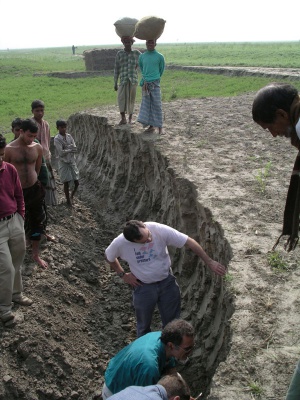Bangladesh field school
Field School in Bangladesh: Interaction of Sedimentation and Tectonics in the Ganges‐Brahmaputra River Delta, February 21 - March 7, 2014

As part of a multidisciplinary international project coordinated by the Lamont Doherty Earth Observatory of Columbia University, a field school is offered on the sedimentary and tectonic processes, and their interaction in the geologically dynamic Ganges-Brahmaputra River Delta. The worldʼs largest delta is being accreted on to the Burma subduction system and overthrust by the Shillong Massif, leading to complex interplay of fluvial and tectonic processes. As part of the field school, alternating lectures, training, and field excursions will be led by US and Bangladeshi project scientists. Topics will rang from river dynamics such as channel island migration and avulsions, and tectonics, such as active folding of the deltaic sediments in the subduction-accretion system and the blind overthrust of the Shillong basement-cored anticline. The school will also focus on their interaction, such as the influence of tectonics on avulsion rates and control of thrusting by the upward coarsening delta strata. The lectures will review foundations and basic techniques and discuss research activities and results of the BanglaPIRE project (http://BanglaPIRE.org). Field sites range from the mobile sand islands of the Brahmaputra River to the folds of the onshore Burma Arc accretionary prism. The school will offer an opportunity for students to participate in a “live” multidisciplinary, international research program. The research project and summer school are funded by the Partnerships for International Research and Education (PIRE) program of the US National Science Foundation. The school will be an advanced study program aimed at graduate students (doctoral level) and post-doctoral fellows. The school will cover lodging, meals, and field trip costs for all participants. Funds to travel to Bangladesh will be available for participants from US universities, with limited funds for other students. Because of logistic constraints, the number of students is limited to about 30, half US and half local. Priority will be given to applicants with an interest in multidisciplinary research spanning sedimentary and tectonic environments.
For more information and to apply: http://www.BanglaPIRE.org/education
Review of applications will begin December 1, 2013, with December 20 as the cutoff date for receipt of applications.
